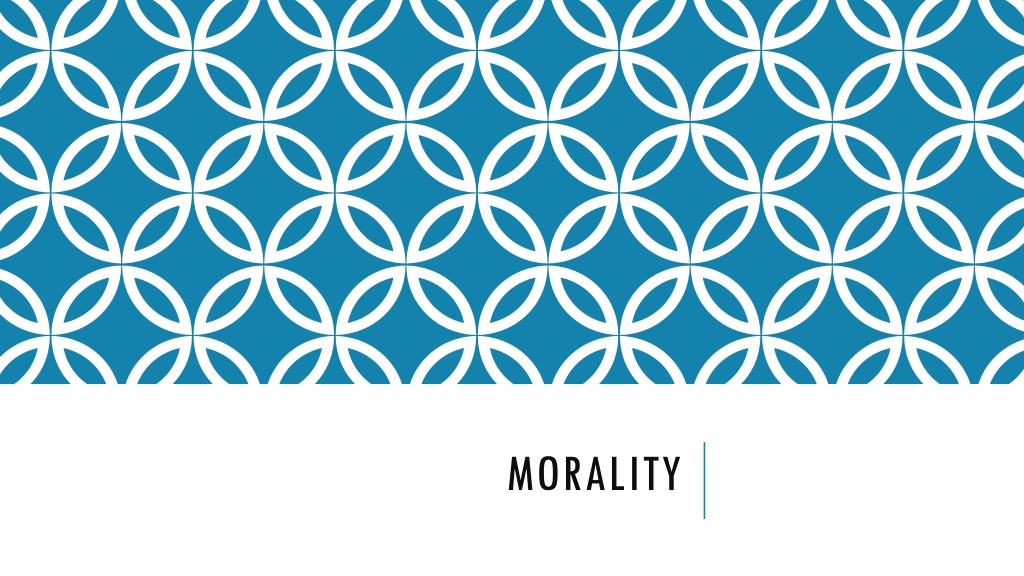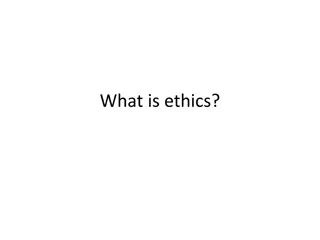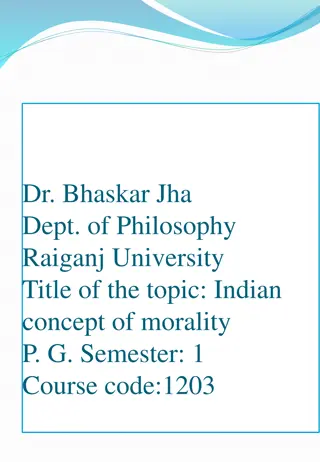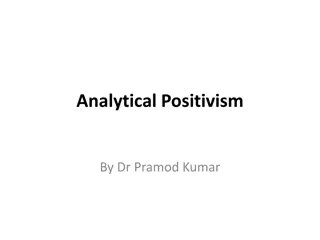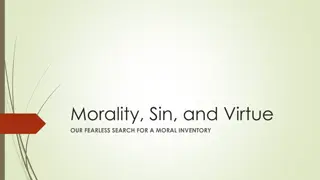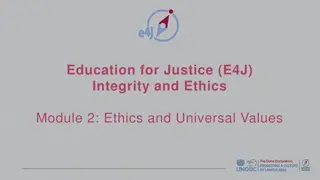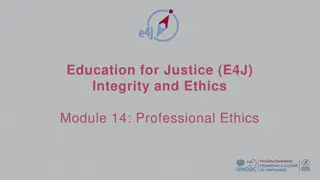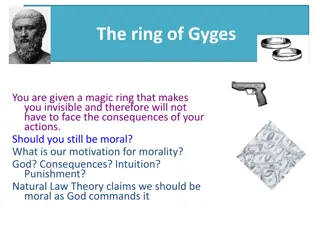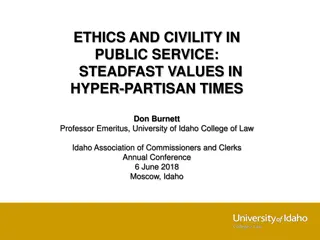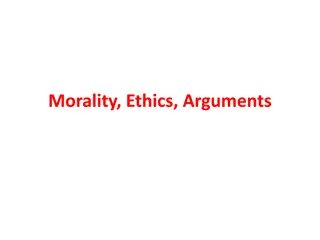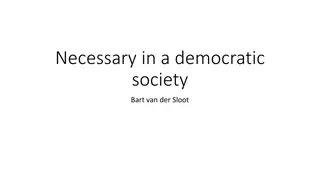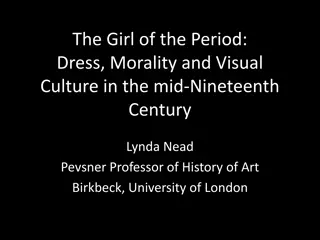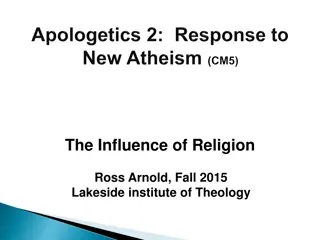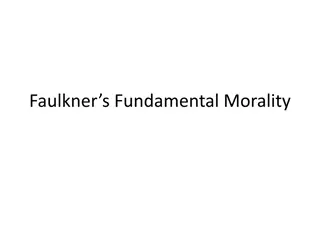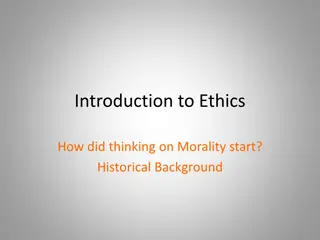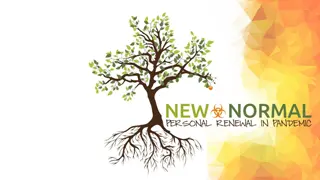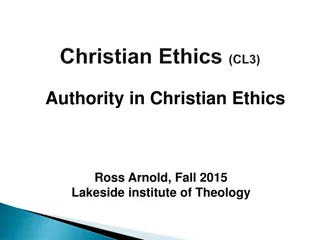Understanding Morality and Its Influences in Human Life
Morality is a fundamental aspect of human existence, shaping behavior based on cultural, religious, and philosophical beliefs. It provides a system for discerning right from wrong and fosters virtues like compassion and justice. This set of rules and principles guides individuals in making sound moral decisions, and while morality is a universal concept, it can vary based on factors like age, culture, religion, and life experiences.
Download Presentation

Please find below an Image/Link to download the presentation.
The content on the website is provided AS IS for your information and personal use only. It may not be sold, licensed, or shared on other websites without obtaining consent from the author. Download presentation by click this link. If you encounter any issues during the download, it is possible that the publisher has removed the file from their server.
E N D
Presentation Transcript
Understand how to make sound moral reasoning Discuss moral values and ideals in a person s life MORALITY Understand the relationship between morality and religion Understand what it means to have moral principles, the nature of conscience, and the relationship between morality and self-interest
LIFE OF HUMAN BEINGS Humans follow a complex life script based on, cultural religious philosophical concepts Beliefs Using the guidelines in that script, individuals then determine whether their actions are right or wrong These guidelines are formulated, generalized, and codified by individual cultures or groups over long periods of time The main purpose of such guidelines is to regulate the behavior of the members of that culture or group to create happiness Morality is the conformity to guidelines
WHAT IS MORALITY? Morality is a set of rules of right conduct, a system used to modify and regulate our behavior It is a quality system by which we judge human acts right or wrong, good or bad This system creates moral persons who possess virtues like being kind to others, compassion, and a desire for justice; thus, it builds character traits in people Morality is applicable to all in a group or society, and having no reference to the will or power of any one individual whatever his or her status in that group or society
WHAT IS MORALITY? Moral code Set of rules Establishes boundaries of generally accepted behavior Different rules often have contradictions Morality Social conventions about right and wrong Widely shared Form basis for an established consensus ETHICS IN INFORMATION TECHNOLOGY, FOURTH EDITION 5
WHAT IS MORALITY? (CONT D.) Morality may vary by: Age Cultural group Ethnic background Religion Life experiences Education Gender ETHICS IN INFORMATION TECHNOLOGY, FOURTH EDITION 6
MORALITY AND RELIGION (ISLAM) Be Patient Be Sincere and Obedient to ALLAH Spend in the way of ALLAH Forgive and be kind to people Invoke ALLAH at night Repent your Sins
What is the difference between an morality and religion? } { DISCUSSION QUESTION Moral + ?? = Capacity for [un]ethical action. Moral compass Moral bankruptcy Moral courage Moral sense Moral philosophy
MORALITY AND RELIGION (ISLAM) (They are) those who are patient, those who are true, and obedient with sincere devotion in worship to Allah and those who spend (their wealth as Zakat and alms) and those who pray and beg Allah s Pardon in the last hours of night. (3:17)
CULTURAL OBLIGATIONS Morality is territorial and culturally based, as long as we live in a society, we are bound to live the society s moral script The actions of individuals in a society only have moral values if taken within the context of this very society and the culture of the Individual Quick look at the culture!
CULTURAL ACCEPTABILITY oAlthough moral values are generally lived and shared values in a society, the degree of living and sharing of these values varies greatly oWe may agree more on values like truth, justice, and loyalty than on others oA number of factors influence the context of morality, including time and place
If morality is a set of shared values among people in a specific society, why do we have to worry about justifying those values to people who are not members of that society? MORAL THEORIES
MORAL THEORIES Let us take some Examples! To justify an action or a principle requires showing good reason for its existence and why there are no better alternatives Justifying morality is not a simple thing since morality, by its own definition, is not simply justifiable especially to an outsider Moral reasons require more justification than social reasons
MORE ON THEORIES We need something that demonstrates that the balance of good in an action is favorable to other people, not only to one s interests and desires Chris MacDonald, moral theories seek to introduce a degree of rationality and rigor into our moral deliberations
WHAT ARE MORAL CODES For one to be morally good, one must practice the qualities of being good To live these qualities, one must practice and live within the guidelines of these qualities. These guidelines are moral codes. The Internet Encyclopedia of Philosophy defines moral codes as rules or norms within a group for what is proper behavior for the members of that group The norm itself is a rule, standard, or measure for us to compare something else whose qualities we doubt In a way, moral codes are shared behavioral patterns of a group These patterns have been with us since the first human beings inhabited the Earth and have evolved mainly for survival of the group or society Societies and cultures survive and thrive because of the moral code they observe. Societies and cultures throughout history like the once mighty Babylonians, Romans, and Byzantines probably failed because their codes failed to cope with the changing times
MORALITY AND CULTURE We have established that morality and cultures are different in different societies This does not, however, exclude the existence of the commonality of humanity with timeless moral code. These codes are many and they come in different forms including: The Golden Rule: Do unto others as you would have them do unto you The Bronze Rule: Repay kindness with kindness , This rule is widely observed because of its many varying interpretations
UNIVERSAL SET OF MORAL CODES There is a commonality of good in these rules which equate to Carl Sagan s culture- free and timeless universal set of moral codes: Be friendly at first meeting Do not envy Be generous; forgive your enemy if he or she forgives you Be neither a tyrant nor a patsy Retaliate proportionately to an intentional injury (within the constraints of the rule of the law) Make your behavior fairly (although not perfectly) clear and consistent
PURPOSE OF MORAL CODES The purpose of moral codes in a society is to exert control over the actions of the society s members that result from emotions Observance of moral codes in most societies is almost involuntary mostly because members of such societies grow up with these codes, so they tend to follow them religiously without question In some societies, observance is enforced through superstition, and in others through folklore (myths and tales) and custom
NEED FOR A MORAL CODE When you ask people what kind of life they like most, the most popular answer is always going to be a life full of freedoms Democratic societies always claim to be free When you ask anyone what they mean by freedom?, they will say that freedom is doing what they want to do, when they want to do it, and in the way that they want to do it (A life without restraints )
HOW TO EXERCISE FREEDOM? Can we live in a society where an individual can do anything that he or she wants? It would be a complete anarchy Well, not so. ALLAH created humans, probably the only creatures on earth who can reason. ALLAH endowed us with the capacity to reason, to create guidelines for life so that everyone can enjoy freedom with reason Freedom with reason is the bedrock of morality True, morality cannot exist without freedom as humans have the capacity to reason, they can attain the freedom they want by keeping a moral code The moral code, therefore, is essential for humanity to attain and keep the freedoms humans need By neglecting the moral code in search of more freedoms, human beings can lose the essential freedoms they need to live Lee Bohannon calls it a moral paradox: by wrongly using your freedom, you lose your freedom Humanity must realize the need for freedom within reasonable restraints with the moral code, because without the code, absolute freedoms result in no freedom at all!
WHAT ARE MORAL STANDARDS A moral standard is a moral norm, a standard to which we compare human actions to determine their goodness or badness This standard guides and enforces policy Morality is a system that, in addition to setting standards of virtuous conduct for people, also consists of mechanisms to self-regulate through enforcement of the moral code and to self-judge through guilt, which is an internal discomfort resulting from disappointment self-mediated by conscience
GUILT AND CONSCIENCE Moral guilt is a result of self-judging and punishing oneself for not living up to the moral standards set for oneself or for the group If individuals judge that they have not done good according to moral standards, they activate the guilt response, which usually makes them feel bad, hide their actions from both self and others, and find a fitting punishment for themselves, sometimes a very severe punishment This internal judgment system is brought about because human beings have no sure way of telling whether an action is good or bad based independently on their own standards
INDIVIDUAL JUDGING CRITERIA Individual standards are usually judged based on group standards So individuals judge themselves based on group standards, and self-judgment sets in whenever one s actions fall short of the group s standards Lets take some Examples!
GUILT THRESHOLD The problem with guilt is that it can be cumulative If individuals commit acts repeatedly that they judge to be below moral standards, they tend to become more and more withdrawn This isolation often leads individuals to become more comfortable with the guilt. As they become comfortable living with the guilt, their previous actions, which were previously judged below standards, begin to look not so bad after all Individuals become more and more complacent about the guilt and begin to look at the whole moral system as amoral
INTENTIONS AND SELF FORGIVENESS Guilt can be eased by encouraging people to focus on the intentions behind the actions Sometimes the intentions may be good but the resulting action is bad. In such a case the individual should not feel so guilty about the action Besides looking for intent, one should also have the will and ability to forgive oneself. Self-forgiveness limits the cumulative nature of guilt and hence, helps an individual to keep within the group
CONSCIENCE Our moral code, and many times the law, lay out the general principles that we oughtnot do because it is wrong to do it! The link must be made by the individual a self- realization. It is this inner judgment that tells us if the act just committed is right or wrong, lawful or unlawful This inner judgment is what we call conscience. Additionally, conscience is the capacity and ability to judge our actions ourselves based on what we set as our moral standards The word conscience comes from the Latin word conscientia which means knowing with. It is an inner voice telling us what to do or not to do This kind of self- judgment is based on the responsibility and control we have over our actions. Conscience is motivated by good feelings within us such as pride, compassion, empathy, love, and personal identification Conscience evolves as individuals grow. The childhood conscience is far different from the adult conscience because the perception of evil evolves with age The benefits of conscience are that the actions taken with good conscience, even if the results are bad, do not make one guilty of the actions
APPLICABILITY OF CONSCIENCE Austin Fagothey, writes that conscience applies to three things: the intellect as a faculty of forming judgments about right and wrong individual acts, the process of reasoning that the intellect goes through to reach such judgment, and the judgment itself which is the conclusion of this reasoning process
MORALITY AND LAW Morality does not belong to any individual, nor does it belong to any society or group of people Thus, it cannot be localized! However, those parts of the moral code that can be localized become law e.g., traffic law
THE PURPOSE OF MORALITY THE GOOD LIFE The ancients identified the purpose of morality with the chief good Because morality is territorial, whatever chief good e.g., happiness observed after graduating, or heavenly afterlife for Muslims is chief good and the moral purpose In general, the chief good is not to suffer and die, but to enjoy and live!
NEXT WEEK Ethics: Analyze an argument to identify premises and conclusion using ethical theories Understand the use of ethical theories in ethical arguments Detect basic logical fallacies in an argument Articulate the ethical tradeoffs in a technical decision Understand the role of professional codes of ethics
